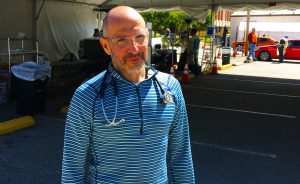More than 1,500 patients have received the treatment so far.

In November, soon after the FDA granted emergency use authorization (EUA) for a monoclonal antibody to treat outpatients with COVID-19, UNC Health’s COVID-19 Therapeutic Infusion Operations Group began providing outpatient infusions of this therapy to patients at three locations: the Pittsboro Therapeutic Infusion Center, run by Deanna Harris; the Children’s Specialty Clinic Raleigh, led by Kevin Brady, Clinical Director of Outpatient Children’s Services; and the Solid Organ Transplant Surgery Infusion Clinic at UNC Medical Center, led by Lana Amend, RN.
“We have treated more than 1,500 patients with one of the three monoclonal antibody treatments that received EUA because they were found to reduce the risk of hospitalization. It is likely we have prevented many people at high risk of severe COVID-19 from advancing to the point that they would need admission,” said Brendan Fitzpatrick, Associate Vice President, Cancer Services at UNC Health.
“Initially, we had been short on infusion nurses, providers to evaluate patients and write orders and, at times, we have been short on the drugs themselves. We now have adequate resources on all fronts, and we anticipate the need for this therapy will last for several months to come, especially as new virus variants emerge,” Fitzpatrick said.
David Alain Wohl, MD, helps to direct the monoclonal antibody treatment program at UNC Medical Center and is conducting studies of this and other treatment approaches for outpatient COVID-19.
“To be effective, monoclonal antibody treatment for early COVID-19 has to be started as soon as possible after symptoms start – ideally within 3-5 days,” Dr. Wohl said. “While vaccination is key to preventing COVID-19, we have a long way to go before the majority of people in the US are vaccinated. For the foreseeable future, people will still become ill with COVID-19 and so we need treatments like monoclonal antibodies to keep people from getting severe disease.” Dr. Wohl points out that despite their promise monoclonal antibodies are under-utilized. “Too few people in the community are aware that there are treatments for COVID-19 and healthcare providers often don’t know much about them or how to access them.”
UNC providers can learn more about monoclonal antibody therapy at UNC Health here and by following the instructions to send an EPIC message to the COVID-19 therapeutics team to refer a patient for treatment. If you have questions, please contact Melissa Malley.
Jessica Lin, MD is the site lead for a study that found Regeneron’s monoclonal antibody led to a major decrease in COVID-19 cases among family members living in the same household.
In addition, Myron Cohen, MD, director of the UNC Institute for Global Health and Infectious Diseases, helped design and oversee a large clinical trial that found bamlanivimab, a monoclonal antibody, significantly reduced the risk of contracting COVID-19 among residents and staff of long-term care facilities. Dr. Wohl was the UNC site principal investigator for that study.
Beginning in August 2020, the study enrolled 340 long-term care residents and 757 staff. Initially, 132 tested positive for the SARS-CoV-2 virus. Of the remaining 965 participants, symptomatic COVID-19 infections were reduced by 57 percent. Among residents, the infections were reduced by 80 percent. There were four deaths among the 965 patients, all of them in the placebo group. When the 132 who tested positive at the study’s beginning were included, there were another four deaths — again, only among patients who received placebo. All deaths were in residents, not staff.